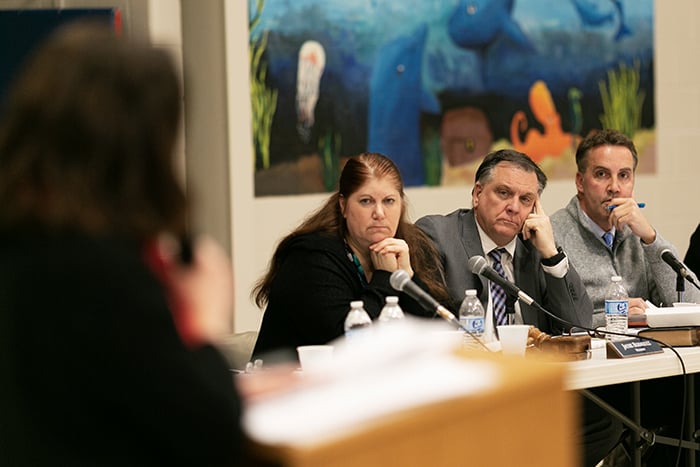
MANCHESTER – Their contract expired six months ago. While they are protected under the terms of that old contract, Manchester Township teachers wore red and sat in on the Jan. 16 Board of Education meeting, wanting to come to terms on several issues, most notably insurance payments.
Dan Staples, president of the Manchester Township Education Association, spoke on behalf of his 560 members at that meeting.
“Despite many difficulties, we’ve continued bargaining in good faith,” Staples said during his approximately three-minute speech to the Board. “But tonight, as you can see, pressure is building, morale is plummeting, and this membership has decided to come here tonight to make it clear that we are more than simply a budget item.”
We are worth it, the teachers would echo back after Staples punctuated statements with the phrase.
It’s the rallying cry of the New Jersey Education Association and its members, who are fighting against ever-increasing health-care costs and fighting for “ESP Job Justice,” the push for due process for education support professionals.
Teachers are looking to have their Chapter 78 contributions cut. Chapter 78 is a law that came into effect the 2011-12 school year, and ties employees’ health care premiums with their salary and health plan. Employees paid anywhere from 3-35 percent of their health care premiums, and never less than 1.5 percent of those premiums. The law was written to have a four-year phase-in, with negotiations on what employees had to contribute opening back in July 2015.
The law was seen as a “welcome relief” to boards of education, according to the New Jersey School Boards Association. It has always been seen as “unfair” to the New Jersey Education Association.

Staples called on the Board to settle the contract Jan. 22, which was both side’s third time meeting with a mediator. (The Manchester Times went to print before details from that meeting could be verified and reported.)
School carries on as business as usual, and staff goes beyond the bounds of their contracts, despite the fact that take home pay continues to decrease because of health insurance deductions, Staples said. Many of them volunteer their time so students have Barnes & Noble night, McDonald’s night, Winterfest, etc. Many of them also couldn’t attend the Board meeting Jan. 16 because they work second and third jobs to make ends meet.
“We need relief. We need to feel respected and valued, and respect starts with a fair contract,” Staples said. “We need a fair contract and we need it now, because we are worth it.”
“This is the second time in four years we’ve experienced a pay freeze with rising health care premiums every year,” Ruth Kennedy, a long-time Manchester resident and special needs preschool teacher at Ridgeway said. “I am grateful for the appreciation you [the Board and administrators] express about the quality and effectiveness regarding our teaching abilities. But unfortunately, the kind words and compliments do not pay my bills, don’t help me provide for my family.”
Manchester School District Business Administrator Craig Lorentzen spoke with The Manchester Times after the Board meeting. He said the Board and administration understand the frustration expressed by teachers and other staff. Gone are the days when both sides simply wrangled over salaries.
“We get where they’re coming from,” Lorentzen said. “But we can’t impact how we educate the students here.”
He said school districts have come to rely on those Chapter 78 contributions. He said the administration is considering moving from a private health care plan to the state plan, but that every bargaining unit, not just teachers, would have to agree to that. And Manchester, already a school district that is underfunded by hundreds of thousands of state dollars, is facing more significant cuts under changes to the state’s funding formula.
“Manchester is a victim of Senate Bill S2, which means over the next seven years Manchester is going to lose state aid,” Lorentzen said during the Board meeting. “This year, we already lost $332,000 in state aid.”
That news came in after staff and programs were already in place for the 2018-19 school year, so the administration looked at line-item cuts instead, doing away with equipment purchases.

He said S2 eliminated a hold harmless provision, which protected school districts from getting less state aid than they received the year before, whether enrollment increased or decreased.
Unless something changes, the district is looking at losing another $1 million in state aid over seven years.
“We’re trying to remain positive and trying to do things to keep what we have in place, keep staff in place, keep programs in place, but it’s going to be a challenge this year and every year following,” he said.







